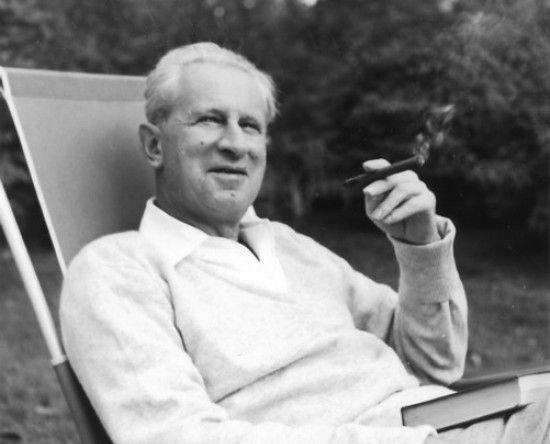Versuch über die Befreiung, Suhrkamp Verlag, S. 21 f.
Herbert Marcuse Berühmte Zitate
Der eindimensionale Mensch, Aus dem Englischen übersetzt von Alfred Schmidt, 3. Aufl., 1989, Suhrkamp Verlag KG, ISBN 3518579215, S. 22 books.google https://books.google.de/books?id=AiItAQAAIAAJ&q=verhungern
"Freedom of enterprise was from the beginning not altogether a blessing. As the liberty to work or to starve, it spelled toil, insecurity, and fear for the vast majority of the population. If the individual were no longer compelled to prove himself on the market, as a free economic subject, the disappearance of this kind of freedom would be one of the greatest achievements of civilization." - One-Dimensional Man. Beacon: Boston 1964
Der eindimensionale Mensch (1964)
„Die freie Wahl der Herren schafft die Herren oder die Sklaven nicht ab.“
Der eindimensionale Mensch. Aus dem Englischen übersetzt von Alfred Schmidt. Suhrkamp 1989, S. 27 books.google https://books.google.de/books?id=AiItAQAAIAAJ&q=schafft
"Free election of masters does not abolish the masters or the slaves." - One-Dimensional Man. Beacon: Boston 1964
Der eindimensionale Mensch (1964)
Der eindimensionale Mensch, 1989, Suhrkamp Verlag KG, ISBN 3518579215, S. 29 books.google https://books.google.de/books?id=AiItAQAAIAAJ&q=auto
"The people recognize themselves in their commodities; they find their soul in their automobile, hi-fi set, split-level home, kitchen equipment." - One-Dimensional Man. Beacon: Boston 1964
Der eindimensionale Mensch (1964)
Einige gesellschaftliche Folgen moderner Technologie, in: Schriften, Bd. 3, Springe 2004, S. 292 f.
Repressive Toleranz, D-Springe, Klampen-Verlag 2004, S. 140
"Freedom is liberation, a specific historical process in theory and practice, and as such it has its right and wrong, its truth and falsehood." - Repressive Tolerance. In Robert Paul Wolff, Barrington Moore, Jr., and Herbert Marcuse: A Critique of Pure Tolerance. Boston: Beacon Press, 1969, pp. 95-137, marcuse.org https://www.marcuse.org/herbert/pubs/60spubs/65repressivetolerance.htm
Herbert Marcuse Zitate und Sprüche
Der eindimensionale Mensch. Aus dem Englischen übersetzt von Alfred Schmidt. Suhrkamp 1989, S. 77 books.google https://books.google.de/books?id=AiItAQAAIAAJ&q=tauschwert
"Exchange value, not truth value counts. On it centers the rationality of the status quo, and all alien rationality is bent to it." - One-Dimensional Man. Beacon: Boston 1964
Der eindimensionale Mensch (1964)
Der eindimensionale Mensch. Aus dem Englischen übersetzt von Alfred Schmidt. Suhrkamp 1989, S. 254 books.google https://books.google.de/books?id=AiItAQAAIAAJ&q=versklavender
"Comfort, business, and job security in a society which prepares itself for and against nuclear destruction may serve as a universal example of enslaving contentment." - One-Dimensional Man. Beacon: Boston 1964
Der eindimensionale Mensch (1964)
„Permanenter ästhetischer Umsturz - das ist die Aufgabe der Kunst.“
Konterrevolution und Revolte. Suhrkamp 1987, S. 105 books.google https://books.google.de/books?id=RBhVAAAAYAAJ&q=permanenter
"Permanent aesthetic subversion - this is the way of art" - Counterrevolution and Revolt. Beacon: Boston 1964, S. 107
„Werte, die aus der objektiven Realität herausgelöst sind, werden subjektiv.“
Der eindimensionale Mensch. Aus dem Englischen übersetzt von Alfred Schmidt. Suhrkamp 1989, S. 162 books.google https://books.google.de/books?id=AiItAQAAIAAJ&q=werte
"values separated out from the objective reality become subjective." - One-Dimensional Man. Beacon: Boston 1964
Der eindimensionale Mensch (1964)
Versuch über die Befreiung (1969), Suhrkamp Verlag, S. 21 f.
"This society is obscene in producing and indecently exposing a stifling abundance of wares while depriving its victims abroad of the necessities of life; obscene in stuffing itself and its garbage cans while poisoning and burning the scarce foodstuffs in the fields of its aggression; obscene in the words and smiles of its politicians and entertainers; in its prayers, in its ignorance, and in the wisdom of its kept intellectuals. [...] Obscene is not the picture of a naked woman who exposes her pubic hair but that of a fully clad general who exposes his medals rewarded in a war of aggression;" - An Essay on Liberation. Boston: Beacon, 1969, pp. 7-8
Herbert Marcuse: Zitate auf Englisch
“Domination has its own aesthetics, and democratic domination has its democratic aesthetics.”
Quelle: One-Dimensional Man (1964), p. 65
“The Foundations of Historical Materialism,” Studies in Critical Philosophy (1972), p. 9
“This is the pure form of servitude: to exist as an instrument.”
Quelle: One-Dimensional Man (1964), p. 33
[describing the view of Husserl] p. 164
One-Dimensional Man (1964)
